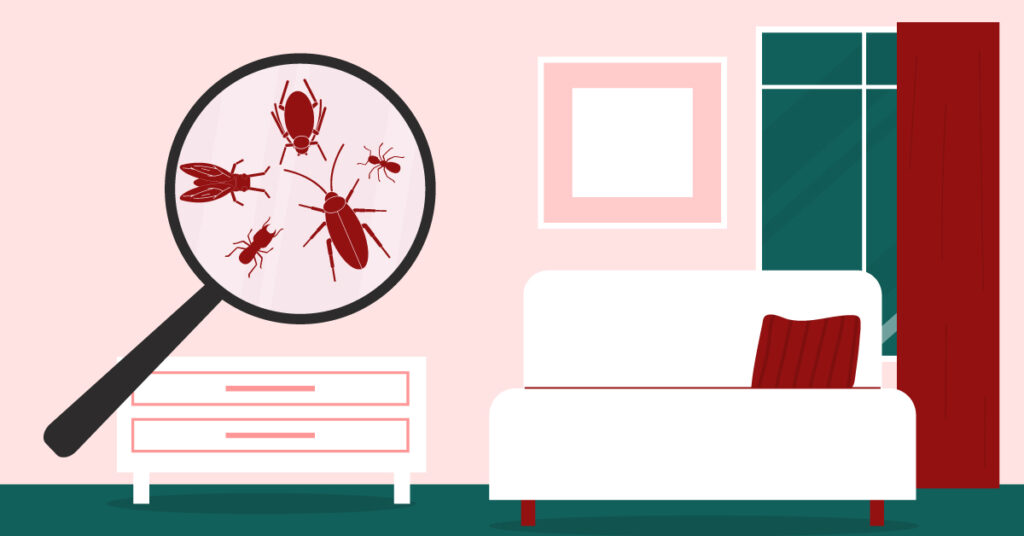Rodent infestations are more than just a pain in the butt and something that gives you the heebie-jeebies. Mice and rats can damage property, contaminate food, spread diseases, and more. However, the good news is, you can effectively keep these unwelcome guests away with the proper prevention methods and control strategies.
Continue below as we share nine effective tips for keeping rodents at bay.
1. Seal Entry Points
One of the most effective ways to prevent a rodent problem is by identifying and sealing off potential entry points. Did you know that rats can fit themselves through holes as small as a quarter? Mice, on the other hand, can squeeze in through gaps as small as a dime. Sealing entry points is crucial for keeping rodents away.
- Inspect the Exterior: Check for any gaps around windows, doors, pipes, and vents. Focus on the foundation, attic vents, and roof, as rodents can climb and access your home from these high areas.
- Seal Holes with Durable Materials: Use materials like steel wool, copper mesh, or caulk to seal gaps and small holes, as these are difficult for rodents to chew through. For larger gaps, consider using metal flashing or expanding foam.
- Install Door Sweeps and Weather Stripping: Ensure doors and windows fit tightly by installing door sweeps and weather stripping, particularly on doors leading to the outside of the garage.
2. Keep Food and Waste Secure
Rodents are drawn to food sources, so keeping food secure and reducing odors can make your property less appealing to them. Small crumbs, pet food, and even garbage can attract mice and rats looking for an easy meal. It is important to keep your home clean so the pests don’t get any ideas.
- Store Food Properly: Keep all food, including pet food, in sealed containers. Avoid leaving food out overnight, and make a habit of wiping down countertops, not leaving a sink full of dirty dishes, and sweeping floors regularly.
- Dispose of Garbage Regularly: Use garbage cans with tight-fitting lids, both inside and outside, to contain odors.
- Clean Up Pet Food: If you feed pets outside, remove any leftover food as soon as they’re finished. This will prevent attracting rodents to your yard and discourage them from seeking shelter nearby, waiting for your animals to be fed.
3. Maintain Landscaping
Your property’s landscaping can unintentionally provide ideal hiding places for rodents. Keeping your yard tidy and managing plants can reduce potential shelter and make it more difficult for rodents to get close to your home.
- Trim Vegetation: Keep shrubs, trees, and bushes trimmed back from the house to eliminate pathways that rodents could use to access your roof or attic.
- Remove Clutter: Get rid of leaf piles, yard debris, and unused items, such as woodpiles and old equipment, where rodents might hide or nest.
- Create a Barrier Around the House: Consider placing a gravel strip around your house foundation, as rodents are less likely to dig through gravel. Avoid dense ground cover right next to your home, as it can provide cover for rodents.
4. Reduce Moisture Sources
Rodents need water as well as food to survive, so limiting access to water sources can make your property less attractive to them. Areas with leaks or standing water create perfect breeding grounds for rodents and other pests.
- Fix Leaks Promptly: Repair leaking pipes, faucets, or appliances, especially in areas like the kitchen, bathroom, basement, or garage.
- Eliminate Standing Water: Make sure gutters are cleaned regularly and direct downspouts away from your foundation. Avoid leaving pet water bowls in your yard and clean up any water collection points.
- Use a Dehumidifier: Basements and crawl spaces are often damp, which can attract rodents. Consider buying a dehumidifier, if you live in a moist climate to keep moisture levels down and discourage rodents from settling in.
5. Implement Rodent Traps and Baits
If you’ve spotted signs of rodents, such as droppings, gnaw marks, or noises in the walls, traps and bait stations can help control the population. Traps are a targeted approach that allows you to address an issue before it becomes a full-blown infestation.
- Place Traps Strategically: Set traps in high-traffic areas where you’ve seen signs of rodent activity, such as along walls, in corners, or near potential entry points. Common trap options include snap traps, glue traps, and live traps.
- Use Appropriate Bait: Mice and rats are drawn to food-based baits, such as peanut butter, cheese, or small pieces of fruit. Avoid touching bait directly, as human scent can make rodents wary of traps.
6. Consider Humane Removal Options
If you prefer not to harm rodents, humane removal methods can effectively control rodent populations while ensuring minimal harm. Live traps are the best option for humane control, allowing you to catch and release rodents away from your home.
- Use Live Traps: Place live traps in areas where rodents are likely to travel. These traps capture rodents without injuring them, and you can release them far from your property.
- Relocate at a Distance: Release trapped rodents at least a mile away from your home to prevent them from returning. Look for wooded areas or fields away from other residences.
- Prevent Return: After removing rodents humanely, seal entry points to ensure they don’t find their way back into your home.
7. Use Natural Deterrents
Several natural repellents can help deter rodents without using chemicals. These methods are a great first line of defense for homeowners looking for environmentally friendly options.
- Peppermint Oil
- Vinegar and Water Spray
- Predator Scents: Predator scents like fox or cat urine can deter rodents. You can purchase these repellents at some garden stores or online and apply them around your property to ward off rodents.
8. Monitor Regularly and Stay Consistent

The key to effective rodent control is consistency. Keeping a close eye for any early signs of rodent activity can help you address small issues before they become larger infestations.
- Inspect Weekly: Conduct weekly checks of your property, especially during colder months when rodents are more likely to seek shelter indoors.
- Track Signs of Rodent Activity: Keep an eye out for droppings, chewed wires, or gnaw marks. The earlier you spot these signs, the easier it is to prevent a full-scale infestation.
- Clean and Reorganize Storage Areas: Rodents often hide in cluttered storage spaces, so periodically clean and reorganize areas like the basement, attic, and garage to make them less appealing.
9. Call a Pest Control Professional if Needed
Sometimes, no matter what you do, a rodent problem can persist or become too difficult to manage by yourself. Hiring a professional might be necessary to help eliminate the infestation effectively and safely.
- Expert Assessment: A professional can identify hidden entry points and nesting areas and recommend the most effective treatment for your property.
- Safe Methods: Pest control companies use safe, regulated methods to control rodent populations, minimizing risks to your family, pets, and the environment.
- Prevention Plans: Many pest control companies offer regular maintenance plans to keep rodents and other pests away from your property year-round.
Keep the Rodents Away
Keeping rodents at bay requires a proactive and consistent approach.
Regular maintenance and monitoring are essential for long-term success, as rodents can quickly take advantage of lapses in control measures. With these effective strategies, you can safeguard your property and enjoy a clean, rodent-free living space for years to come.
You might also be interested in: Preventing Pests in the Kitchen: 9 Tips for Maintaining a Bug-Free Pantry




